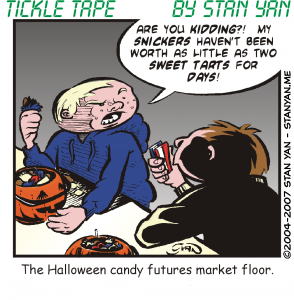The human mind has remarkable abilities of imagination. If we can think it, we can make it happen. Well, that’s what we like to believe. There are a few lucky people in this world who can do anything they set their mind to, but there are others who must assess their financial and psychological resources and find a close match between their personality and trading style.
Perhaps the biggest decision a trader must make is deciding between long-term investing and short-term trading. In his book, “Trade Your Way to Financial Freedom,” Dr Van K. Tharp outlines the advantages and disadvantages of each approach. For example, short-term traders can take advantage of a variety of trading opportunities because they make many more trades than a long-term investor, but they may also pay more for transaction costs since they make so many more trades.
From a psychological point of view, short term trading has many additional costs. There is more psychological pressure when trading in the short term. Sure, you can realize more trading opportunities and make more money, but you also open yourself to losing more money. For some people, the psychological risks far outweigh the benefits. It’s up to you to determine how well your personality and resources fit the short-term trading style. Indeed, if you have a personality style conducive to trading in the short term, you may prefer it. You may be the kind of person who is easily bored and craves excitement. Short-term trading is much more exciting than long-term investing.
Dr Tharp points out that craving for excitement isn’t related to making more money; it is just a psychological need. But if you are the kind of person who needs stimulation, you will see the added stress of short-term investing as pleasurable and may prefer this style of trading. Some short-term traders also see risk differently in the short-term window. While some long-term investors see short-term variation as noise and prefer a longer-term trend, short-term traders like the idea of reducing their exposure to risk by getting in and out of the markets as quickly as possible. In the end, it’s all a matter of preference. One trader’s view of security is another trader’s idea of risk.
Long term trading also has its disadvantages. The moves are smaller, and thus, you need more capital to make profits. There are fewer opportunities for profit, so you must make sure you see and trade an opportunity when it presents itself. It also requires patience to stay in the market for a longer duration. Many traders make the mistake of looking at their long-term investments too often, and end up selling early just because they see a momentary fluctuation and impulsively take action.
Regardless of the time frame you chose, it’s important to look at your financial and psychological resources closely and find a style that fits you. It’s up to you in the end. Don’t try to be someone you are not. Just because you can imagine trading under all possible circumstances does not mean that you can. If you find the style that fits you best, you’ll make more profits in the long run.


